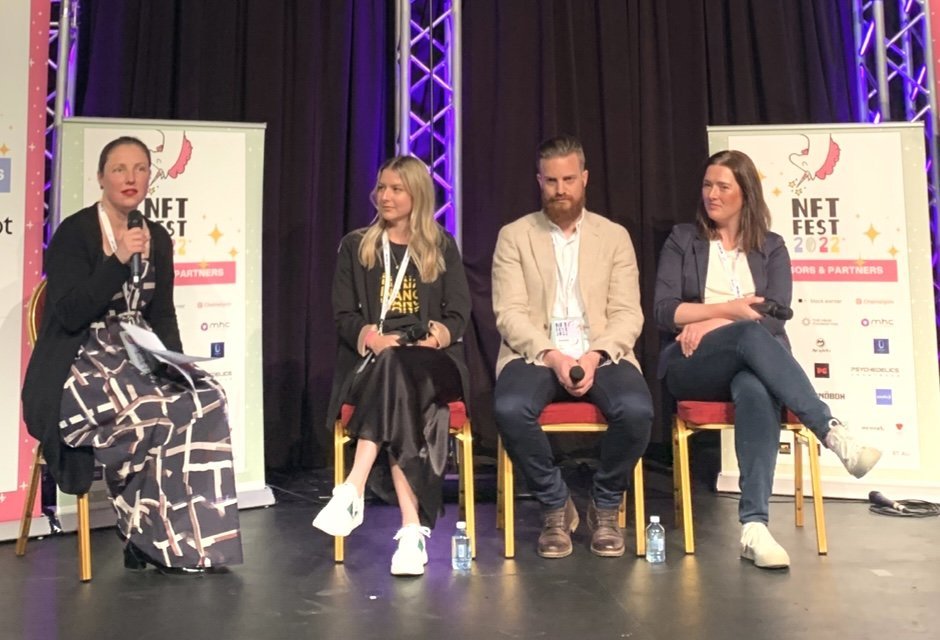‘I’m an innovator’ is not a defense: Scenes From NFT Fest Aus as Community Girds Against Bad Actors
All the best parts of the recent NFT Fest Aus

As a tumultuous year for crypto draws to a close, the conversation among Australia’s crypto community is squarely on the approach that regulators will take in the coming year
The Australian NFT community finally got its opportunity to meet in person and en masse in Melbourne recently for NFT Fest Aus. It was a celebratory atmosphere with a diverse agenda that brought together Australia’s creator economy, banks and payment providers, crypto exchanges, gaming, music and sporting industry players.
The message of the event: Build ventures with strong use cases that prove the relevance and sustainability of the decentralized economy. Not surprisingly, the collapse of the world’s second-largest crypto exchange FTX, and the fear that a more heavy-handed approach from regulators may stifle innovation dominated conversation, on and off the stage.
Just one month prior, Australia’s regulator, the Australian Securities and Investments Commission (ASIC) commenced legal proceedings in the Federal Court against BPS Financial, “for allegedly making false, misleading or deceptive representations and engaging in unlicensed conduct in relation to a non-cash payment facility involving a crypto-asset token called Qoin (the Qoin Facility),” according to the release they issued on the matter.
This is the first time the Australian regulator has taken federal legal action against a crypto-asset token. It is being viewed as a test case and has the Australian crypto ecosystem paying close attention to what happens next. ASIC has stated that it will be going after ‘misconduct involving high risk products including crypto assets’ as part of its priorities in 2023.
Read more: Singapore’s Cryptocurrency Reluctance Put in Perspective by Vitalik Buterin: Scenes from the Singapore Fintech Festival
Describing regulation as “probably the least sexy subject you can have at an NFT Fest” Caroline Bowler, CEO of Australia’s first licensed cryptocurrency exchange, BTC Markets, pulled no punches.
“This is a watershed point in time for cryptocurrency and ergo, also for the NFT industry,” Bowler said. “It is something that everybody who is interested in this space needs to pay very close attention to. Irrespective of whether you may think you are too small, or that you are doing things with the best of intentions, that will not withstand scrutiny when regulators come knocking.”
To which Natasha Blycha, Managing Director of web3 specialist law firm, Stirling & Rose added, “‘I’m an innovator’ is not a defense.”
Kevin Rose of PROOF and Moonbirds being interviewed by Greg Oakford, co-founder NFT Fest Aus
Blycha called on those in the room involved in issuing or dealing in crypto tokens, even if they are NFTs, to “ask yourself what's happening inside your NFT. Do you intend for your NFT to have yield farming or staking? There are different things your NFT can do that changes the way it is characterized by legal markets.” She said if it is “operating as money, it needs a license.”
Fellow panelist Tim Wilks, chief of business development at Australian crypto exchange CoinSpot, remarked, “When you're looking at centralized exchanges, you need to look at how they hold themselves, how they behave within the market, and the measures they go through to protect their customers. There's currently nothing that says that we need to abide by an industry code of conduct, which we all do, or to get security certifications, or independent audits or anything like that. But we are doing this because we are looking to protect our customers in the best possible way. And because we believe it's the right thing to do.”
CoinSpot has become the first Australian crypto exchange to proactively appoint external auditors to report on its financial position and verify it has sufficient funds.
FTX collapse discussed
The FTX collapse was triggered after it became known that it did not hold sufficient reserves to protect it from a large-scale fund withdrawal incident. This led to exactly that, a bank run, bringing the exchange to its knees. Since the collapse of FTX, there have been calls for all centralized crypto exchanges to provide transparent and up-to-the-minute data, known as a proof of reserves, to alleviate customer concerns and restore consumer confidence in cryptocurrency. Prior to the collapse of FTX, approximately 96 percent of all cryptocurrency trading was running on centralized exchanges.
On the matter of the FTX collapse and the collateral damage to the reputation of cryptocurrency, Bowler of BTC Markets, who also serves on the board of Blockchain Australia, added, “I think with ASIC in particular, the point that we try to drive home is that the issue is not, and was never about, cryptocurrency. The issue is about the behavior of humans. And what we should be looking to do from a regulatory point of view is regulate the behavior of humans, not try to interfere with what the technology itself is doing. And I think that's probably a key point that everyone in our industry can coalesce around.”

